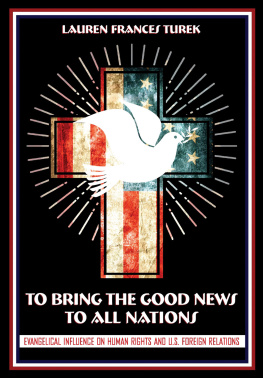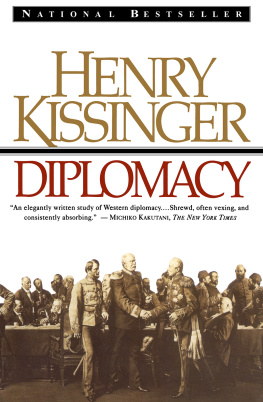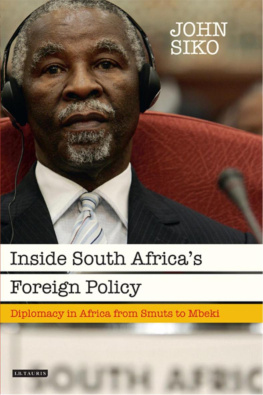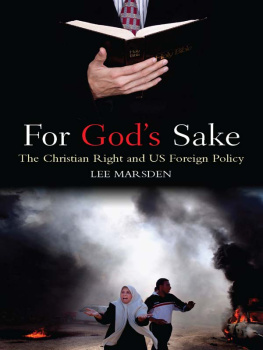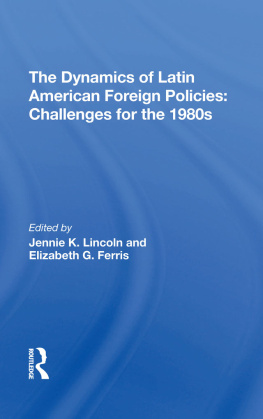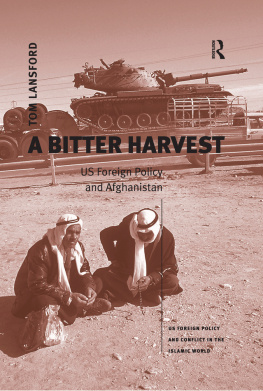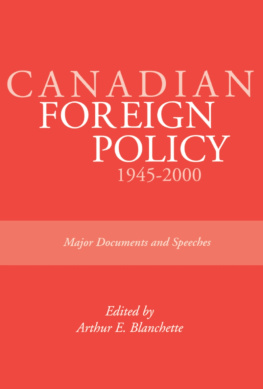Abbreviations
ABM Anti-Ballistic Missile
AE African Enterprise
AFM Apostolic Faith Mission
ANC African National Congress
AUCECB All-Union Council of Evangelical Christians and Baptists
BGEA Billy Graham Evangelistic Association
CAAA Comprehensive Anti-Apartheid Act
CCECB Council of Churches of Evangelical Christians-Baptists
CIS Commonwealth of Independent States
CREED Christian Rescue Effort for the Emancipation of Dissidents
CRI Christian Response International
CSCE Conference on Security and Cooperation in Europe
CSI Christian Solidarity International
ECWA Evangelical Church of West Africa
ELWA Eternal Love Winning Africa
EWNS East/West News Service
FEBC Far East Broadcasting Company
HCJB Heralding Christ Jesus Blessings network
ICOWE International Congress on World Evangelization
IGE Iglesia Guatemalteca en el Exilio
IRCEBCSU International Representation for the Council of Evangelical Baptist Churches of the Soviet Union
ISEES Institute of Soviet and East European Studies
LCWE Lausanne Committee for World Evangelization
MARC Missions Advanced Research and Communication Center
MFN Most Favored Nation
MLN Movimiento de Liberacin Nacional
NAE National Association of Evangelicals
NCC National Council of Churches
NRB National Religious Broadcasters
NSC National Security Council
NSDD National Security Decision Directive
RSA Republic of South Africa
SACC South African Council of Churches
SACLA South African Christian Leadership Assembly
SALT Strategic Arms Limitation Treaty
SBC Southern Baptist Convention
SGA Slavic Gospel Association
SWAPO South West Africa Peoples Organization
TWR Trans World Radio
UDHR Universal Declaration of Human Rights
WCC World Council of Churches
WEF World Evangelical Fellowship
WEFCC World Evangelical Fellowship Communications Commission
Acknowledgments
We often think of researching and writing a book as a solitary task, but I have found the opposite to be true. Throughout this endeavor, I have been blessed with more help and support than I could possibly deserve from many wonderful advisers, colleagues, archivists, family members, and friends.
I could not have researched and written this book without the generous financial support that I received from Trinity University, the Institute for Political History, The John C. Danforth Center on Religion and Politics at Washington University in St. Louis, The Institute for Advanced Studies in Culture at the University of Virginia, the Society for Historians of American Foreign Relations, the American Historical Association, the Lynde and Harry Bradley Foundation at the University of Virginia, the University of Virginia Society of Fellows, the Billy Graham Center Archives/The Torrey M. Johnson, Sr. scholarship fund, The Institute of the Humanities and Global Cultures at the University of Virginia, the Corcoran Department of History at the University of Virginia, and the Robert J. Huskey Travel fund at the University of Virginia.
I am grateful to Melvyn Leffler, who has been a tireless champion of this project from the very beginning. Mel is an unparalleled scholar, thinker, and adviser, and I consider myself lucky to have had the honor of working with him. During my time as a graduate student, he provided me with the right mix of encouragement and advice, as well as the intellectual freedom I needed to develop as a scholar. His generous and rigorous feedback encouraged me to write clearly and think incisively. The insights that he provided have improved my workand this bookimmeasurably. I cannot imagine a better mentor or role model.
I also owe a debt of gratitude to other scholars who aided me in my studies at the University of Virginia, including Brian Balogh, Marc Selverstone, Matt Hedstrom, Phyllis Leffler, Jennifer Burns, Sophia Rosenfeld, J.C.A. Stagg, Mark Thomas, Stephen Schuker, Charles Mathewes, Ethan Schrum, and Christopher Nichols. Valarie Cooper introduced me to the fascinating world of Pentecostalism and played a significant role in shaping this project. I also benefited greatly from discussions with Brian Owensby about Latin American history and with John Edwin Mason about South African history. I received much good advice on the manuscript, as well as much needed merriment, from my UVA colleagues, including Stephen Macekura, James Wilson, Brent Cebul, Harold Mock, Evan McCormick, Mary Barton, Kelly Winck, Alexandra Evans, Joseph Scott, Philip Herrington, Cecilia Mrquez, Tamika Richeson, Alec Hickmott, Mary Hicks, Willa Brown, and Chris Cornelius. Brian Rosenwald, Rhonda Barlow, Kate Geoghegan, and Emily Senefeld deserve special thanksI will cherish their support and the friendships we forged in graduate school forever.
I had the good fortune to spend the 201415 academic year at the John C. Danforth Center on Religion and Politics at Washington University in St. Louis. The faculty and staff there provided me with a congenial intellectual home, and I thank Darren Dochuk, Laurie Maffly-Kipp, Leigh Schmidt, Marie Griffith, Mark Valeri, Lerone Martin, Rachel Lindsay, Ronit Stahl, Maryam Kashani, Stephanie Wolfe, Sheri Pea, and Debra Kennard for their invaluable help and feedback on my work.
My colleagues at Trinity University also deserve special thanks. Carey Latimore has cheered me on and supported me from the moment I arrived in the department. Jason Johnson, Aaron Navarro, Gina Tam, Nicole Marafioti, David Lesch, Anene Ejikeme, Ken Loiselle, Erin Kramer, Linda Salvucci, Todd Barnett, Emilio de Antuano, Michael Hughes, Claudia Stokes, and Angela Tarango have provided generous feedback on my work and a truly gratifying work environment. I am also appreciative of the research assistance I received from my students Katie Welch and Meg Chase, who gathered interesting reading material for me.
Countless archivists assisted me in my research. All deserve commendation, but I owe special thanks to Bob Shuster and Katherine Graber at the Billy Graham Center Archives, Keith Call at the Wheaton College Special Collections Buswell Library, Thelma Porres, Blanca Velsquez, Anas Garca Salazar, and all of the other staff members at the Centro de Investigaciones Regionales de Mesoamrica, as well as the staff at the National Archive of South Africa for their tremendous help and patience. They went above and beyond to aid me in my research. I am also thankful to the Billy Graham Evangelistic Association for granting me permission to reference their materials in this book.
Many colleagues and scholars read chapters, commented on conference papers, or provided advice or feedback in other ways. I thank Melani McAlister, Sarah Snyder, Andrew Preston, Cara Burnidge, Mark Edwards, Emily Conroy-Krutz, John Wilsey, Dan Hummel, Amanda Demmer, Rasmus Sndergaard, Hideaki Kami, Michael Cangemi, Susie Colbourn, Simon Miles, Mitch Lerner, Andy Johns, Jeff Engel, Kyle Longley, Liz Borgwardt, Vanessa Walker, Bob Brigham, Mark Philip Bradley, Virginia Garrard-Burnett, and Randall Balmer, among many others.
A version of chapter 5 appeared in the September 2015 issue of Diplomatic History, under the title To Support a Brother in Christ: Evangelical Groups and U.S.-Guatemalan Relations during the Ros Montt Regime. The author thanks the editors of Diplomatic History for their permission to republish this material.
My deepest thanks to Michael McGandy, Karen Laun, Irina Burns, and the other members of Cornell University Press who nurtured this project. Their tireless work, candid suggestions, and careful editing made the final manuscript much better, and they have been a joy to work with every step of the way. I also very much appreciate Sandy Aitken, who did the painstaking work of preparing the index.

